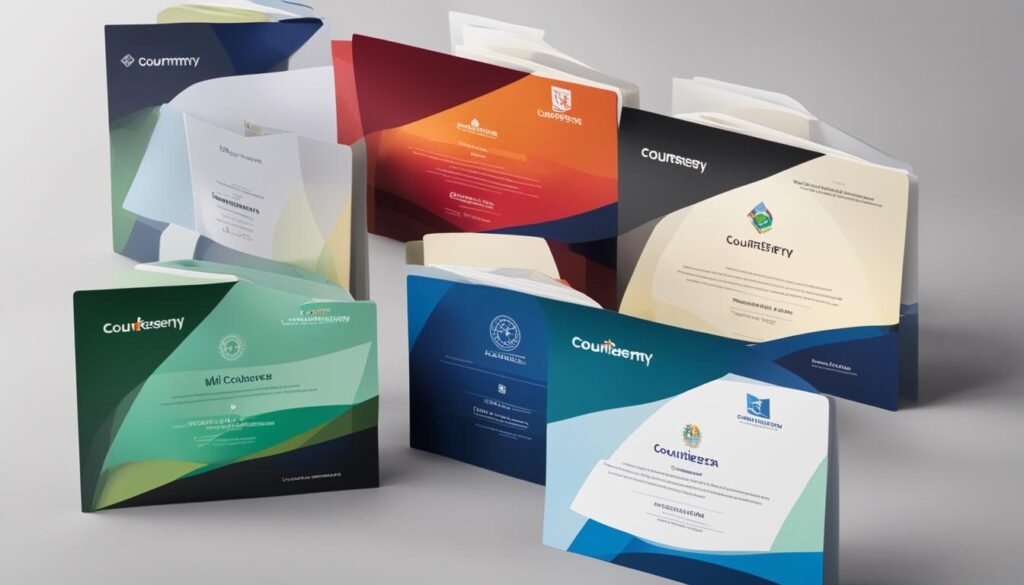Looking to expand your knowledge and acquire new skills? Online learning platforms have become an increasingly popular choice for personal and professional development. With so many options available, it can be overwhelming to decide which platform is the best fit for you. In this article, we will compare two leading online learning platforms, Coursera and Udemy, to help you make an informed decision.
Key Takeaways:
- Coursera and Udemy are prominent online learning platforms in 2024.
- Both platforms offer a wide range of courses to cater to different interests and learning goals.
- Coursera features university and institutional partnerships, providing structured and accredited courses.
- Udemy offers user-generated content and a self-paced learning environment.
- The choice between Coursera and Udemy depends on your preference for accreditation, course quality, learning style, and budget.
Coursera: University and Institution Partnerships
Coursera has established partnerships with universities and institutions worldwide, offering a diverse range of courses suited for learners of all backgrounds. Through these collaborations, Coursera provides opportunities for individuals to access education from prestigious institutions and gain valuable knowledge and skills.
Advantages of Coursera’s University and Institution Partnerships
When you choose Coursera for your online learning needs, you can expect:
- Structured and Formal Education: Coursera’s courses, developed in collaboration with universities, follow a more structured and formal approach, akin to traditional university classes. This ensures that the content is cohesive, comprehensive, and designed to provide a high-quality educational experience.
- Degree Programs and Specializations: In addition to individual courses, Coursera offers specialized programs and even full degree programs in partnership with universities. This allows learners to pursue a specific field of study and earn recognized credentials, such as bachelor’s or master’s degrees.
- Quality Assurance: Coursera courses undergo a meticulous quality assurance process, ensuring that the content meets the highest standards. This scrutiny guarantees that learners receive accurate information, reliable resources, and an exceptional learning experience.
With Coursera’s university and institution partnerships, you can enjoy the benefits of a well-structured education and earn certifications or degrees from acclaimed institutions. Whether you’re looking to enhance your professional skills, explore new subjects, or further your career, Coursera provides a platform for growth and development.
“The collaboration between Coursera and top universities brings the best of both worlds: the flexibility and accessibility of online learning combined with the credibility and reputation of renowned academic institutions.” – [Author Name]
| Advantages of Coursera’s University and Institution Partnerships |
|---|
| Structured and Formal Education |
| Degree Programs and Specializations |
| Quality Assurance |
Udemy: User-Generated Content and Self-Paced Learning
When it comes to online learning platforms, Udemy stands out for its unique approach. One of the key features that sets Udemy apart is its user-generated content model. Unlike other platforms that rely on partnerships with institutions, Udemy allows anyone to create and sell courses. This open model has resulted in a vast library of courses on various topics, giving learners a wide variety of options to choose from.
However, it’s important to note that the quality of courses on Udemy can vary significantly. While many instructors offer high-quality content and valuable knowledge, others may not meet the same standards. As a learner, it’s essential to read reviews and check the instructor’s credentials before enrolling in a course.
One of the major benefits of Udemy is its self-paced learning approach. Unlike structured courses on other platforms, Udemy courses are designed to be completed at your own speed and on your own schedule. This flexibility is especially valuable for individuals with busy lives or those who prefer to learn at their own pace. You can start and finish the courses whenever it suits you, making it convenient for both full-time professionals and part-time learners.
Moreover, Udemy often offers courses at a lower price point compared to other platforms. With frequent sales and discounts, you can find high-quality courses at affordable prices. This makes it an excellent choice for individuals who want to enhance their skills or explore new subjects without breaking the bank.
To summarize, Udemy’s user-generated content model provides a diverse range of courses on various topics. The self-paced learning approach allows you to learn at your own speed, while the affordability makes it accessible to a wider audience. Consider these factors when deciding on an online learning platform that aligns with your needs and preferences.
Testimonials
“Udemy’s self-paced learning has been a game-changer for me. I can take courses at my own speed, and the affordable prices make it easy to explore new subjects without breaking the bank!” – Sarah K.
Advantages of Udemy
- Wide variety of courses on various topics
- Flexible self-paced learning
- Affordable prices with frequent sales and discounts
Course Offerings and Subject Areas
When it comes to the variety of courses offered, both Coursera and Udemy have a lot to offer. So whether you’re looking to enhance your technical skills or delve into a new hobby, you’re bound to find something that suits your interests on either platform.
Coursera provides a robust selection of courses in a wide range of academic and professional subjects. From computer science and business management to data science and humanities, Coursera partners with renowned institutions to deliver high-quality courses that cater to different interests and career paths.
Udemy boasts an extensive catalog of courses covering a diverse array of subjects. Whether you’re interested in web development, graphic design, photography, personal finance, or even yoga, Udemy has you covered. The subject diversity on Udemy is particularly impressive, making it a great platform for those seeking a broad range of learning opportunities.
Both platforms offer courses in popular domains, allowing you to acquire new skills and knowledge in areas that are in-demand in today’s job market. Whether you prefer the structured approach of Coursera or the wide variety of subjects available on Udemy, you have plenty of options to choose from to further your education and professional development.
| Coursera | Udemy |
|---|---|
| Academic subjects | Web Development |
| Business Management | Graphic Design |
| Data Science | Photography |
| Computer Science | Personal Finance |
| Humanities | Yoga |
Course Quality and Instructors
When it comes to course quality and instructors, Coursera takes the lead. Thanks to its partnerships with universities and experts, Coursera courses are designed and taught by professors and experts from top institutions. This ensures a consistently high level of quality and credibility throughout their course offerings.
On the other hand, Udemy follows a different model, allowing anyone to create and sell courses on their platform. While this approach results in a wide variety of courses, it also means that the quality of courses can vary significantly. It’s important to note that Udemy provides user ratings and reviews to help learners make informed decisions about the course quality.
“Coursera courses are crafted and delivered by renowned instructors from prestigious institutions, ensuring a top-notch educational experience.”
While the course quality on Coursera is generally higher, Udemy offers an opportunity for instructors who may not have traditional academic backgrounds to share their expertise in niche areas. The user ratings and reviews can help learners navigate through the vast library of Udemy courses and find instructors who have proven their expertise in their respective fields.
When it comes to choosing between Coursera and Udemy, it’s important to consider your learning goals. If you prioritize a structured and high-quality learning experience, Coursera may be the better choice. However, if you are looking for a specific niche course that may not be available on other platforms, Udemy could provide the unique learning opportunity you seek.

In the following table, we compare the course quality and instructor features of Coursera and Udemy:
| Coursera | Udemy | |
|---|---|---|
| Course Quality | High, with courses designed and taught by professors and experts from top institutions | Varies, as anyone can create and sell courses |
| Instructors | Renowned professors and experts from prestigious institutions | Wide range of instructors with varying backgrounds |
| User Ratings and Reviews | N/A | Provided to help learners make informed decisions |
Pricing and Payment Models
When considering which online learning platform to choose, understanding the pricing and payment models is crucial. Both Coursera and Udemy offer different approaches to pricing their courses.
Coursera provides a mix of free and paid courses, giving learners the option to explore a wide range of subjects without any financial commitment. However, if you decide to pursue a specialization or professional certificate, additional fees will be required. Coursera also offers a subscription option called Coursera Plus, which provides unlimited access to courses for a monthly fee.
On the other hand, Udemy operates on a pay-per-course model. Courses on Udemy are individually priced, typically ranging from $20 to $200. This pricing structure allows learners to select courses based on their specific interests and budget. Moreover, Udemy often runs promotions and discounts, making it more affordable for those looking to expand their knowledge and skills.
Comparative Pricing and Payment Models
Let’s take a closer look at the pricing and payment models for Coursera and Udemy:
| Coursera | Udemy |
|---|---|
| Mix of free and paid courses | Pay-per-course model |
| Additional fees for specializations and professional certificates | Pricing between $20 and $200 per course |
| Subscription option (Coursera Plus) for unlimited access | Promotions and discounts available |
As seen in the table above, Coursera offers a more diverse pricing structure with the option for free courses and additional fees for specializations. On the other hand, Udemy provides a pay-per-course model with the flexibility to choose courses that fit within your budget. Additionally, both platforms offer their own unique pricing features, such as Coursera Plus and Udemy’s frequent promotions and discounts.
Consider your budget and learning needs when deciding which pricing and payment model best suits you. Coursera’s mix of free and paid options, as well as professional certifications, may be ideal for those seeking a more structured and recognized educational experience. Meanwhile, Udemy’s pay-per-course model and affordability make it a great choice for learners looking to explore a wide range of topics at their own pace.
Certifications and Accreditation
One important aspect to consider when choosing an online learning platform is the availability of certifications and their recognition in the job market. Both Coursera and Udemy provide certificates, but there are some differences in terms of accreditation and recognition.
Coursera Certificates
Coursera offers a range of accredited certifications, including course certificates, professional certificates, and specializations. These certifications are recognized by top universities and institutions, ensuring their value and credibility. In addition, Coursera also offers fully accredited degrees in partnership with reputable universities.
“Coursera’s certificates hold recognized value in the job market, providing learners with a competitive edge in their careers.”
Udemy Certificates
On the other hand, Udemy provides a certificate of completion for each course. While these certificates demonstrate your completion of a course, they may not carry the same level of recognition as Coursera’s certificates in terms of accreditation by universities and institutions.
It’s important to note that the value of certificates may vary depending on the industry and specific job requirements. Some employers may prioritize Coursera certifications due to their accreditation and partnership with renowned institutions, while others may appreciate the knowledge and skills gained from Udemy courses.
Ultimately, the choice between Coursera and Udemy certifications depends on your career goals, industry expectations, and personal preferences. If accreditation and recognition are essential for your career advancement, Coursera’s accredited certifications may be the better option. However, if you’re looking to enhance your knowledge and skills in a specific area without focusing on formal accreditation, Udemy’s certificates can still provide valuable learning outcomes.
It’s worth noting that in addition to certifications, your real-world application of the skills learned through these platforms will significantly impact your success in the job market. Employers often value practical experience, so leveraging the knowledge gained from Coursera or Udemy courses in real-life projects is crucial.

Having discussed the certifications and accreditation offered by Coursera and Udemy, let’s now explore the overall learning experiences and available resources on these platforms.
Learning Experience and Resources
When it comes to the learning experience, Coursera and Udemy offer distinct approaches that cater to different preferences.
Coursera Learning Experience
Coursera provides a more structured learning experience for students. Courses on Coursera often include assignments, quizzes, and deadlines, which can help you stay motivated and accountable throughout your learning journey. The structured approach offers a sense of progression and ensures that you cover all the necessary topics within a specified timeframe.
In addition to the structured coursework, Coursera also provides networking opportunities through discussion forums, allowing you to connect with fellow learners from around the world. Furthermore, Coursera offers access to additional learning resources such as academic journals, which can enhance your understanding of the subject matter and provide a more comprehensive learning experience.
Udemy Learning Experience
Udemy, on the other hand, offers a more self-paced learning environment. With lifetime access to course materials, you can learn at your own speed and revisit the content whenever you need a refresher. This flexibility is particularly beneficial if you have a busy schedule or prefer to set your own learning pace.
In addition to the course content, Udemy provides a Q&A forum where you can interact with instructors and fellow learners. This forum allows you to ask questions, seek clarification, and engage in discussions related to the course material. It creates a collaborative learning environment and fosters a sense of community among learners.
Overall, Coursera’s structured learning experience with assignments, quizzes, and networking opportunities appeals to those who prefer a more traditional educational approach. On the other hand, Udemy’s self-paced learning environment and interactive Q&A forum cater to learners seeking flexibility and a more community-driven experience.
An image representing the learning experience offered by Coursera and Udemy.
Conclusion
After comparing Coursera and Udemy, it is clear that both platforms have their own unique strengths and weaknesses. The choice between them ultimately depends on your specific learning needs, budget, and preferences.
Coursera stands out for its partnership with universities and institutions, offering more formal education, accreditation, and a structured learning experience. If you’re looking for a higher level of credibility, quality assurance, and the opportunity to earn degrees or specializations from reputable institutions, Coursera may be the better choice for you.
On the other hand, Udemy shines in its vast library of user-generated content, providing a wide variety of topics to choose from. With self-paced learning and affordable pricing, Udemy is a great option if you prefer flexibility, a diverse range of subjects, and a budget-friendly learning experience.
It’s worth considering using both platforms for different purposes. Combining Coursera for formal education and Udemy for supplemental and self-paced learning allows you to take advantage of the strengths of each platform. This way, you can benefit from the structured and accredited courses on Coursera while exploring a broader range of topics on Udemy.
FAQ
Is Coursera or Udemy better for online learning?
The choice between Coursera and Udemy depends on your specific learning needs, budget, and preferences. If you’re looking for a more formal education, accreditation, and a structured learning experience, Coursera may be the better choice. If you prefer a wide variety of topics, self-paced learning, and affordability, Udemy could be the platform for you.
What is the main difference between Coursera and Udemy?
Coursera collaborates with universities and institutions to offer a wide range of structured courses, including specializations and even full degree programs. Udemy allows anyone to create and sell courses on various subjects, resulting in a vast library of courses with a more self-paced learning approach.
What types of courses are available on Coursera and Udemy?
Coursera offers courses in a wide range of academic and professional subjects, including computer science, business management, data science, and humanities. Udemy offers a vast selection of courses covering a wide array of subjects such as web development, graphic design, photography, personal finance, and yoga.
Are the courses on Coursera and Udemy of the same quality?
The quality of courses and instructors on Coursera is generally higher due to its partnerships with universities and experts. Coursera courses are designed and taught by professors and experts from top institutions, ensuring a consistently high level of quality and credibility. On Udemy, the quality of courses can vary as anyone can create and sell courses. Udemy provides user ratings and reviews to help learners make informed decisions about the course quality.
How much do the courses on Coursera and Udemy cost?
Coursera offers a mix of free and paid courses, with additional fees for specializations and professional certificates. Coursera also offers a subscription option called Coursera Plus for unlimited access to courses. Udemy operates on a pay-per-course model, with courses priced between $20 and $200. Udemy often runs promotions and discounts.
Do Coursera and Udemy offer certifications?
Coursera offers a range of accredited certifications, including course certificates, professional certificates, specializations, and even fully accredited degrees. These certificates and degrees hold recognized value in the job market. Udemy provides a certificate of completion for each course, although it may not have the same level of recognition as Coursera’s certificates.
What is the learning experience like on Coursera and Udemy?
Coursera offers a more structured learning experience with assignments, quizzes, and deadlines. It also provides networking opportunities and access to additional learning resources such as academic journals. Udemy offers a more self-paced learning environment with lifetime access to course materials and a Q&A forum for interaction with instructors and learners.


